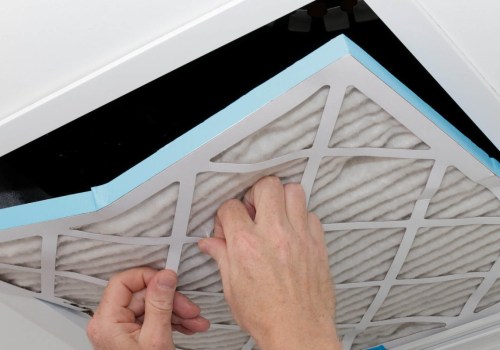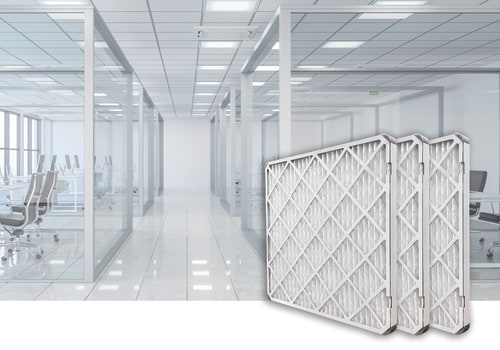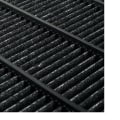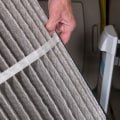Importance of MERV Ratings for Air Filter Durability During HVAC Mold Remediation
Wondering about the importance of MERV ratings for your HVAC air filter during mold remediation? They hold significant value. Minimum Efficiency Reporting Value is a system that evaluates a filter's capacity to trap particles. A high score indicates superior filtration abilities. However, one must consider that these top-rated filters place increased demands on your heating and cooling system and necessitate frequent maintenance. On the other hand, offer longer service life and trap more mold spores, making them ideal for mold remediation.
It's important to factor in energy consumption and filter expenses, possibly consulting an expert for advice. Finding the right balance is crucial, including determining the perfect rating filter efficiency for your specific needs.
Key Takeaways
• Air filters with high MERV ratings demonstrate superior durability, proving more efficient during mold remediation tasks.
• Mold spores, even the minute ones, get captured efficiently by filters boasting higher MERV ratings, aiding in their prevention and controlling their spread.
• High MERV filters necessitate more care, yet their use enhances HVAC system efficiency by curbing disruptions associated with mold.
• Choosing a suitable MERV rating is critical, creating a balance amongst mold remediation needs, strain on HVAC air ducts, and upkeep expenses.
• Frequent maintenance of filters is indispensable in mold remediation, given that filters with high MERV ratings tend to gather trapped particles rapidly.
Understanding MERV Ratings
Grasping MERV ratings is crucial, given their role in assessing your air filter's performance and longevity. MERV, an acronym for Minimum Efficiency Reporting Value, is a standard for rating filter efficiency. Filters with higher MERV ratings trap more particles. However, higher ratings are not always beneficial. The reason is that higher MERV ratings can lead to increased resistance to airflow, potentially causing strain on your HVAC system.
Therefore, while aiming to enhance indoor air quality, straining the HVAC system is not desirable. It's crucial to find a balance.
Your indoor air requirements should guide your choice. For individuals with good health and minor dust concerns, air filters with lower MERV ratings might be sufficient. On the other hand, for people with allergies or compromised immune systems, air filters with higher MERV ratings could be necessary.
This process is not complex; it requires matching your needs to the appropriate filter. Thus, invest time in understanding MERV ratings. Your indoor air quality and the lifespan of your air filter depend on this understanding.
Air Filter Durability and MERV
MERV ratings significantly influence air filter durability. Filters with superior MERV ratings usually have extended lifespans and increased efficiency. Their ability to trap more particles without blockage contributes to this enhanced longevity.
• Extended Lifespan: Filters with superior MERV ratings outlast those with lower ratings. This longevity reduces replacement costs.
• Improved Efficiency: High-quality filters not only enhance air quality but also facilitate smoother HVAC system operation. This efficiency can result in considerable energy cost reductions.
• Less Maintenance: Superior MERV rating filters necessitate fewer replacements, saving you maintenance time and effort.
However, high MERV filters can overburden your HVAC system if not suited to its capabilities. Consult a professional to ensure a suitable filter choice for your HVAC system. When selecting MERV ratings for air filters, aim to balance longevity, efficiency, cost-effectiveness, and maintenance requirements for optimal benefits.
Impact of MERV on Mold Remediation
Air filters with high MERV ratings demonstrate an increased capacity for trapping small particles, a feature critical for mold remediation. Higher MERV ratings directly correlate to more effective mold prevention, as these filters capture and retain mold spores, curtailing their spread through your HVAC system.
However, one must consider the balance between efficiency and maintenance. Filters with elevated MERV ratings, though they can trap more mold spores, demand more regular upkeep. Inattention to this essential maintenance could result in clogged filters, reduced airflow, and ironically, mold propagation within the filter itself. Thus, regular maintenance is paramount for sustaining the effectiveness of high MERV filters.
Selecting the Right MERV Rating
Selecting an appropriate MERV rating for air filters depends on multiple elements. These include individual health requirements plus the HVAC system. With higher MERV ratings, filters trap particles more efficiently. However, this also implies increased maintenance and possibly elevated costs over time. Despite this, cleaner air benefits and reduced mold issues might justify the expenditure.
Consider the following when choosing your filter's MERV rating:
• Health Requirements: For individuals or families struggling with allergies or respiratory conditions, filters with top MERV ratings are ideal. They ensure optimal effectiveness in eliminating allergens from the air.
• HVAC System Specifications: Not every system can accommodate high MERV filters. Review your system's capabilities before making a final decision.
• Expenditure and Upkeep: Filters with superior MERV ratings necessitate more regular replacements, escalating the costs over time. Nonetheless, balance these expenditures against the advantages of cleaner air and minimized mold issues.
Maximizing HVAC Efficiency With MERV
Selecting an appropriate MERV rating for air filters can boost HVAC system efficiency, resulting in significant energy conservation.
To begin, comprehend that filtration becomes finer with increasing MERV values, allowing fewer contaminants to pass. Despite this, HVAC equipment needs to exert more effort to circulate air through filters with higher MERV ratings. Striking a balance is crucial here. Choose a MERV rating not excessively high or low for your specific HVAC equipment to ensure optimal efficiency without causing undue strain on the system.
Achieving this equilibrium can result in appreciable energy conservation. Essentially, you obtain purer air while consuming less energy, beneficial on two fronts. Moreover, an appropriate MERV rating can increase indoor air quality by removing more pollutants and allergens, contributing to a healthier living space.
Frequently Asked Questions
What Is the Cost Difference Between Low and High MERV-Rated Air Filters?
Filters with high MERV ratings command a higher price compared to their low-rated counterparts. Despite this initial investment, their superior ability to trap pollutants makes them a cost-effective solution in the long run. This can lead to savings on future health and maintenance expenses.
How Often Should I Replace My Air Filter During a Mold Remediation Process?
Air filter replacement frequency increases during mold remediation. Suggestion stands at every 30 days, yet depends on mold severity.
Can a Higher MERV Rating Impact My HVAC Systems Energy Consumption?
Indeed, energy consumption of your HVAC system is susceptible to the MERV rating. Filters with superior ratings capture more particles, causing the system to exert additional effort. This extra work results in diminished energy efficiency, potentially reducing filter lifespan. Selecting the optimal balance between filtration effectiveness and efficiency is crucial.
Are MERV-Rated Filters Effective Against Other Pollutants Like Dust and Pollen?
Yes, MERV-rated filters perform effectively against pollutants such as dust or pollen. These filters significantly elevate indoor air quality, promoting better respiratory health while decreasing allergies. This situation benefits your health greatly.
What Precautions Should I Take When Installing a New MERV-Rated Filter in My HVAC System?
Proper installation of new MERV-rated filters maintains their efficiency. Regular inspections for possible leaks play a central role. Take into account that filters with higher MERV ratings might increase your HVAC system's energy usage.
Learn more about HVAC Care from one of our HVAC solutions branches…
Filterbuy HVAC Solutions - Air Conditioning Service
2521 NE 4th Ave, Pompano Beach, FL 33064
(754) 247-3511
https://maps.app.goo.gl/JmWkEXya7uzuLzBh8










